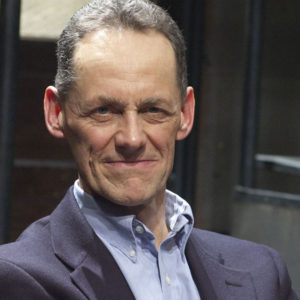A Mugging on Lake Street
On its face, the attack made no sense. I’d never seen my assailant before; he’d never seen me.

For three years, a small group of playwrights worked with TimeLine Literary Manager Ben Thiem in a series of meetings, workshops and readings to develop a new play from start to finish. We asked each playwright in the 2013-2016 inaugural Playwrights Collective to talk a little bit about their play and their process, to be featured on Behind the ‘Line. Today we invite you inside the brain of playwright John Conroy.
Through my time with the Playwrights Collective, I began working on a play loosely based—and I mean very loosely—on a mugging that took place on the west side. In 2008, I was on my bike on Lake Street on my way back from a meeting with a colleague, and in what seemed like the next instant, I was semi-conscious and being helped up off the pavement.
On its face, the attack made no sense. I’d never seen my assailant before; he’d never seen me. No words were exchanged. Nothing was taken.
Like many crime victims, I wanted the incident, which changed my life for the worse, to have some meaning. I eventually sat down with the young African-American man who’d been arrested. He admitted he was there, but not that he was guilty, and although I came away from the experience much wiser, I eventually came to wonder if the attack had any meaning at all.
Roughly a year and a half later, Chicago magazine published my article A Mugging on Lake Street, reflecting on the incident, my experience with my assailant, his family, and the criminal justice system, and my questions about the whole notion of hate crimes.
TimeLine Associate Artistic Director Nick Bowling, who directed the magnificent production of my play My Kind of Town in 2012, stumbled upon that article when he was searching Google Images for a photo of the playwright to show his sister, visiting from out town. A photo of me with my face torn up was one of the selections. He clicked through, read the piece, and sent it to Artistic Director PJ Powers. The two, who had given me invaluable advice as I worked on the My Kind of Town script, suggested it might make for good raw material for my next play. And so I have developed a script tentatively titled Last Man Standing.
I’ve kept only the bare bones of the actual incident: An unemployed investigative journalist gets whacked by an African American teenager. I’ve re-invented those two characters and added family members, a friend, and a girlfriend.
My fear of not having pages to read when my turn came always overwhelmed my fear that I didn’t know precisely where the characters were going to end up and that the play might be fatally flawed in some way I could not see. Ben and my fellow playwrights were terrific with insight, support, and encouragement.

Most of the play was written on the El in half-hour bursts as I rode to and from work. No passengers inspired me because almost from day one I could see the characters in my head. They arrived with certain baggage that included rooms, locations, and manners of speech. I had a beginning (the mugging) and a middle (a meeting of the two protagonists) but only a vague idea of the end. I emphasize the word vague. I ultimately got there, but it wasn’t enough. TimeLine’s Ben Thiem, who pulled the Playwrights Collective together every month, was full of sage advice throughout the process, and he suggested that the two main characters meet one more time. And so they do, as enemies who need each other.
That summation might seem to indicate that I felt like I knew what I was doing and mostly where I was heading throughout the process, but I can assure you that was not the case. I was plagued by doubt. I was driven to stay the course because of the monthly meetings of the TimeLine Playwrights Collective. My fear of not having pages to read when my turn came always overwhelmed my fear that I didn’t know precisely where the characters were going to end up and that the play might be fatally flawed in some way I could not see. Ben and my fellow playwrights were terrific with insight, support, and encouragement.
This post is second in a blog series reflecting on the work of the 2013-2016 Playwrights Collective. Read the other posts in the series:
- Literary Manager Ben Thiem on the challenges of writing history
- Playwright Susan McLaughlin Karp on the 1930s-era Kennedy/Kardashian-like Mitfords
- Playwright Brett Neveu on the development of his play To Catch a Fish, now slated to premiere in our 2017-18 season
- Playwright Alice Austen on seeking further understanding Russia and the Russian mentality
- Playwright Frances Limoncelli on a story that encourages us to see the racism within us, not just outside of us
- Playwright Emily Dendinger on a magical woman who went after what she wanted, despite obstacles
